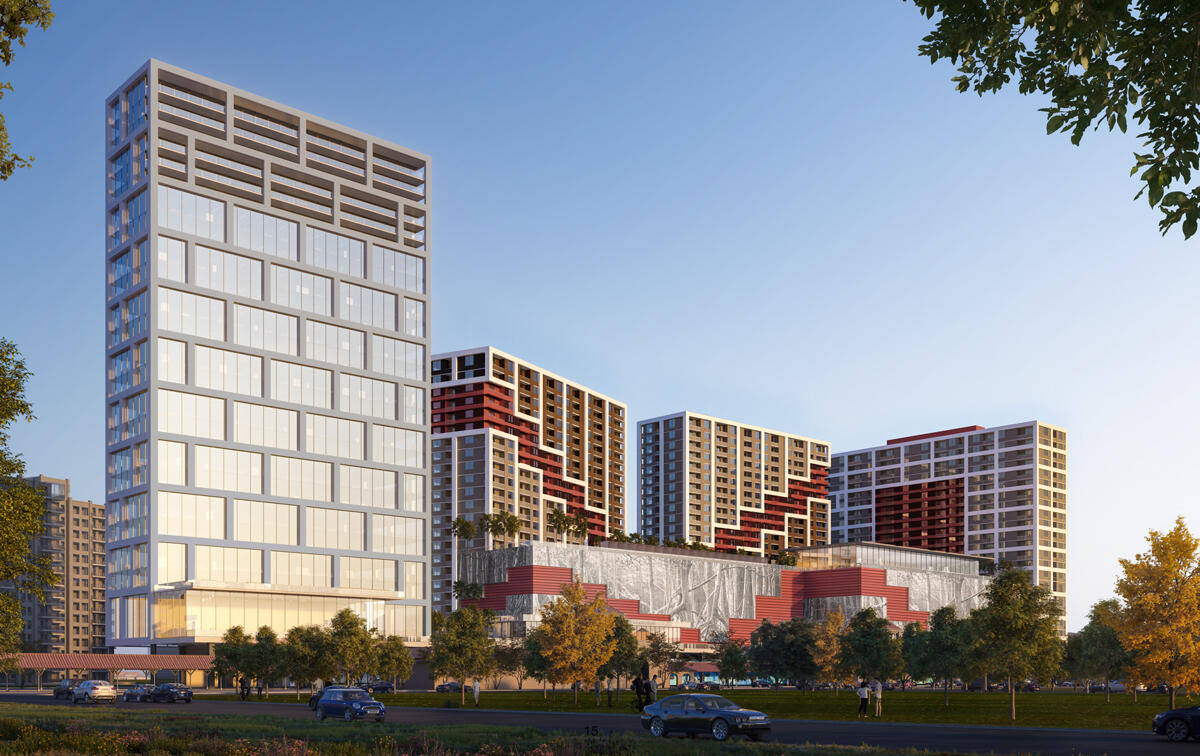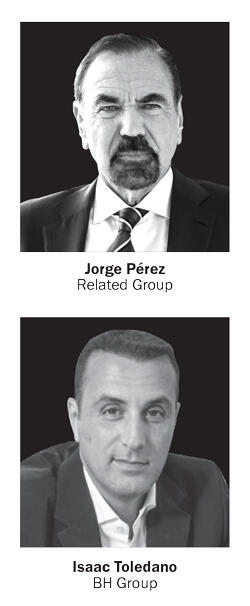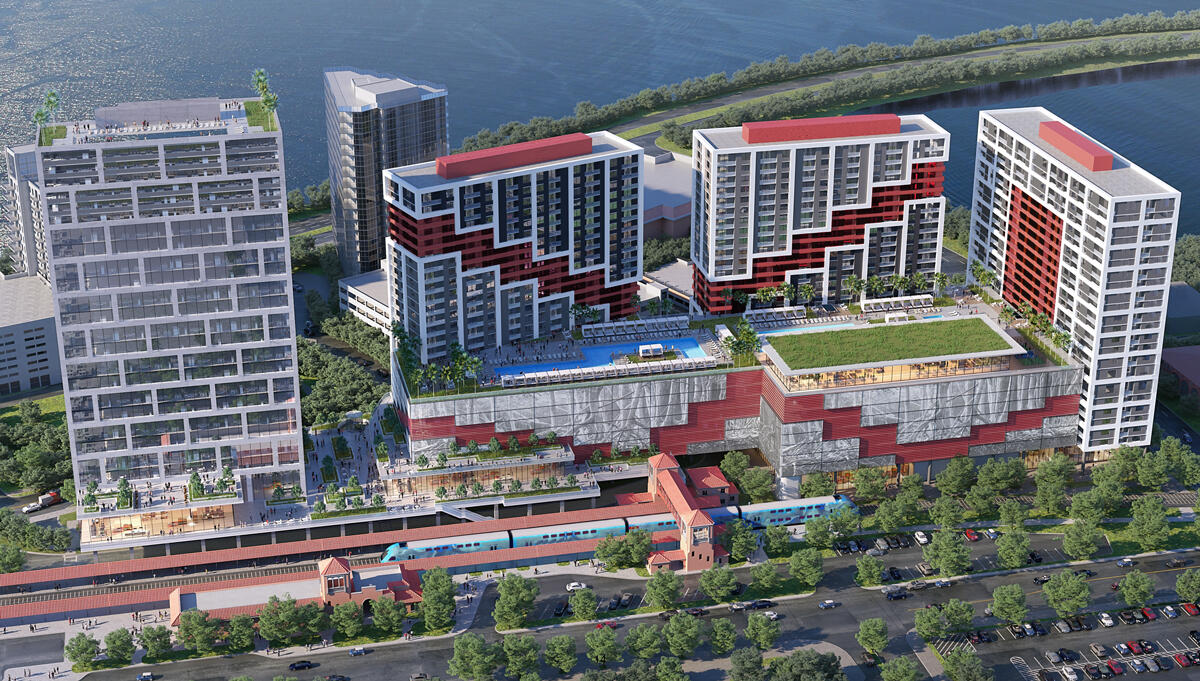Teddy Sagi sits back on his white couch, his high-rise apartment window framing Dubai’s palm tree-lined Jumeirah Bay, and says he’s not the guy to ask for the details.
Even though the Israeli billionaire is backing major new developments in South Florida, he’s worlds away. Inquire about those projects, and he can’t tell you much.
“There’s no transaction in Miami that is under my decision or control,” he said.
Sagi, who with a net worth of $5.2 billion is the seventh-richest Israeli, built his fortune through his online gambling software development firm, Playtech, and later through savvy fintech investments. He diversified into property bets in Europe and the U.K. and is now setting his sights on Miami, backing three major South Florida developments to the tune of $50 million. The projects will bring more than 1,000 residential units, offices, a hotel and retail space to the region.
But Sagi insists he is merely the moneyman for the developers, a partnership between Jorge Pérez’s Related Group and Isaac Toledano of BH Group.
Two of the developments will breathe life into long-stalled projects in West Palm Beach and North Miami, and the third will add ultra-luxury condos to an exclusive island off Miami Beach.
“I am not involved in the day-to-day,” Sagi said. “It’s something I haven’t done in many, many years because I am a billionaire for many, many years.”
Everything is related
Sagi is an enigma in South Florida. And South Florida was an enigma to Sagi — until he met Toledano.
The two were introduced sometime in 2017 or 2018 by a biotech investor at Sagi’s home. Toledano, in turn, introduced Sagi to Related boss Pérez in 2019.
“[Toledano] is a family man. I am a family man. He has eight children. I have seven children. So that’s it,” said Sagi, whose long-time partner is Yael Nizri, a former Miss Israel.
Sagi was eager to diversify his wealth. Related, the region’s most active developer, was looking to move on three ambitious projects in prime locations: the mixed-use Transit Village in West Palm Beach, the shuttered White House Inn site in North Miami and a coveted undeveloped plot on Fisher Island.
Related is the developer taking the lead on construction and sales, and Sagi is a passive investor in the projects.
“You’d have to be huge to have skilled positions at scale in all of those markets,” University of Miami business school professor Andrea Heuson said of Related.
On Fisher Island, the partners are planning a 50-unit, ultra-luxury building where condos will ask over $30 million on average — likely marking South Florida’s most expensive new development on a per-unit basis. Instead of launching sales to the public, they are looking to boost the project’s cachet by inviting select buyers in.
In West Palm Beach, the partners invested in developer Michael Masanoff’s Transit Village, a project that had been mired in delays for years. BH brought Related and Sagi to the deal, Masanoff said.
The plan is for a mixed-use development across four 25-story towers with almost 1,000 residential units rising atop a major downtown West Palm transit hub.

Renderings of the Transit Village project in downtown West Palm Beach (Arquitectonica)
And in North Miami, the partners are looking to develop an $85 million condo building on a waterfront site they acquired for $11 million last year.
Sagi says he saw “an amazing, amazing opportunity” to invest in Florida during the pandemic, as the state remained largely open with few restrictions on people or businesses. Many individuals and companies relocating from the Northeast landed in South Florida, which has long been welcoming to new residents.
“We are pretty famous for being tolerant of different viewpoints,” said Heuson, the professor. “It seems like these very wealthy guys are really conservative, [and] they can be conservative here.”
Chips on chips
Sagi (pronounced Sa-gee) grew up in Tel Aviv, the son of a travel agent and a cosmetician, and served in the Israel Defense Forces. At first, his path to becoming a billionaire wasn’t clear: In his 20s, he landed in prison.
In 1996, he was convicted in Israel of bribery and fraud, with his sentence including nine months’ imprisonment, according to the Financial Times.
Since then, his record has been clean, Sagi said, citing approval from regulatory commissions in Europe and the United Kingdom for his gambling and financial tech ventures.
In 1999, two years before he turned 30, he launched Playtech; he took the company public in 2006 and grew it largely through acquisitions.
As he diversified into other industries, Sagi kept employing the Playtech playbook: Take the company public, tap the right team and let it run free.
With payments company SafeCharge, for example, Sagi turned to David Avgi and took it public on the London Stock Exchange in 2014.
“He left me basically to drive the business for so many years and support me as [he was] the main shareholder and investor,” said Avgi, who was the CEO.
Sagi sold SafeCharge to Canadian payment processing tech firm Nuvei in 2019 for $889 million.
 In the case of the cybersecurity firm now known as Kape, Sagi bought what was an advertising tech startup called Crossrider in 2012 and took it public in 2014.
In the case of the cybersecurity firm now known as Kape, Sagi bought what was an advertising tech startup called Crossrider in 2012 and took it public in 2014.
Sagi said that the company’s primary focus on marketing made it “very, very hard.” So he turned to tech and finance exec Ido Erlichman to drive the firm’s pivot to cybersecurity. By 2018, Crossrider was renamed Kape and its share price had climbed 185 percent from its low, Israeli business publication Globes reported. Sagi owns 55 percent of Kape shares.
“I underwrite all the deals to make all the investors happy,” he said.
Sagi began selling his shares in Playtech in 2016, giving him a war chest from which to keep diversifying. Two years later, he had fully exited his investment and pumped some of the proceeds into buying Israeli duty-free operators.
Hot target
Sagi’s marquee property is Camden Market, a hub of London counterculture that’s home to 700 merchants peddling vintage, handcrafted and oddball goods.
His LabTech Investments oversees 2 million square feet of real estate in the U.K., including the recently completed mixed-use Camden Market Hawley Wharf complex. He also has real estate across Europe, counting a portfolio of residential units in Madrid and Barcelona among his assets.
In London, Sagi mostly got ahead of the slowdown in the British economy by selling £1 billion, or about $1.2 billion, worth of real estate in the last two years, said LabTech CEO Eylon Garfunkel.
“A lot of people were saying, ‘Why are you doing this?’ Obviously now with everything that happened, it puts us in a very, very, very [good] position to capitalize on any future opportunities,” Garfunkel said.
Sagi’s success has afforded him a lifestyle that’s a far cry from his middle-class beginnings. Today, his lavish homes include a waterfront house in Herzliya Pituach near Tel Aviv, which he bought in 2010 for 135 million shekels (about $39 million in today’s money), a record residential deal in Israel at the time, according to the Jerusalem Post.
The 21,500-square-foot home on a half-acre lot on Galei Tchelet Street, considered Israel’s most expensive, includes a wine cellar and gym.
Now his home is in Dubai, which opened its economy to Israeli investors with the 2020 Abraham Accords. While he renovates and adapts a home for his large family, Sagi’s renting a house and building a 30,000-square-foot mansion, all in the neighborhood of Jumeirah Bay, he said in an interview, during which his children could be heard playing in the background.
Asked about his long-term goals, Sagi said, “My dream is to have 10 children.”
But family man hasn’t always been how the mogul has been perceived. Sagi, who once reportedly dated Israeli supermodel Bar Refaeli, has shown a consistent penchant for partying that landed him in hot water during the height of the pandemic.
After returning to Israel in June 2020 from Cyprus, where he holds citizenship, Sagi was granted an exemption from a two-week home-isolation mandate and attended a party in Tel Aviv. In a statement, the Israeli Health Ministry called the exemption a “grave error of judgment” and said it would investigate. Sagi’s publicist dismissed the controversy and said the exemption was above-board.
And then there was a Hollywood-esque ordeal.
 In October of last year, Israeli media circulated reports out of Cyprus that a hitman was after Sagi over alleged debts to Russian business partners.
In October of last year, Israeli media circulated reports out of Cyprus that a hitman was after Sagi over alleged debts to Russian business partners.
After being warned by security authorities, Sagi fled Cyprus, the publications said.
The Israeli government and Sagi then pushed back on the reports, saying the targets were Israeli businessmen in Cyprus but not Sagi himself. As the investigation evolved, Cypriot police charged six individuals with planning to assassinate Israelis in the country, Globes reported. Some of those charged had alleged ties to the Lebanese political movement Hezbollah, which has been designated a terrorist organization by the United States and Israel. Authorities later made public the initials of the targets. Sagi’s were not among them.
“Because I am famous,” Sagi said, “they put my name [in articles].”
Shifting sands
The market has changed since Related, Sagi and BH debuted their partnership last year.
“Now we are more conservative,” Sagi said.
Since Related announced the projects with Sagi and BH, interest rates have more than doubled. Construction costs are still on the rise, and demand is plateauing. Related, the condo giant that most other developers watch for signs of distress, is starting to exercise caution. In October, it scaled back the size of its planned St. Regis Residences in Miami’s Brickell by eliminating one tower, and pulled out of a $500 million buyout offer for an older condo building in Miami Beach.
Sagi underwrote the entirety of his, Related and BH’s purchase of the 6.5-acre Fisher Island property — which means he was prepared to finance the entire acquisition. By the time the trio closed on the site for nearly $123 million in September, a fourth investor, the U.S. arm of Chinese firm Wanxiang America Real Estate Group, had joined the venture.
The terms of their investment in the West Palm Beach Transit Village project is unknown. In September, the development scored final approval from a city committee — a key step for the project, which has been in the works since at least 2010.
All project stakeholders — Related President Jon Paul Pérez, Toledano and Masanoff — were at the meeting, except for Sagi, who was in London.
That’s “the beauty in the way I build businesses,” Sagi said. “I am not running the businesses.”
